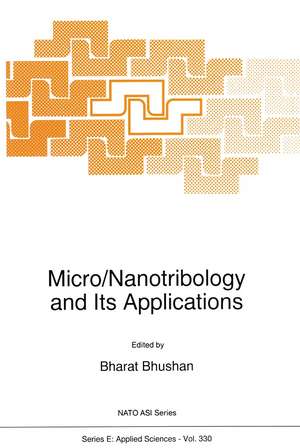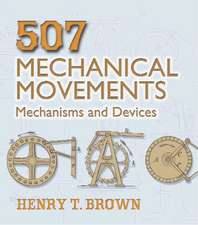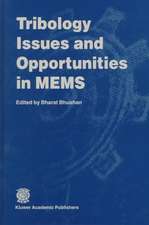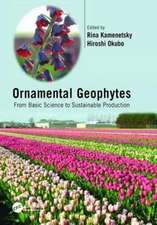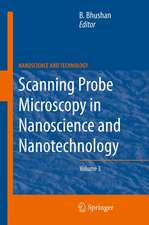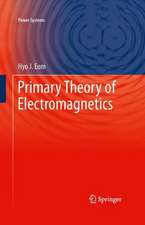Micro/Nanotribology and Its Applications: NATO Science Series E:, cartea 330
Editat de Bharat Bhushanen Limba Engleză Paperback – 9 noi 2012
The present work commences with a history of tribology and micro/nanotribology, followed by discussions of instrumentation, basic theories of friction, wear and lubrication on nano- to microscales, and their industrial applications. A variety of research instruments are covered, including a variety of scanning probe microscopes and surface force apparatus. Experimental research and modelling are expertly dealt with, the emphasis throughout being applied aspects.
| Toate formatele și edițiile | Preț | Express |
|---|---|---|
| Paperback (1) | 1235.57 lei 6-8 săpt. | |
| SPRINGER NETHERLANDS – 9 noi 2012 | 1235.57 lei 6-8 săpt. | |
| Hardback (1) | 1241.90 lei 6-8 săpt. | |
| SPRINGER NETHERLANDS – 31 ian 1997 | 1241.90 lei 6-8 săpt. |
Din seria NATO Science Series E:
- 24%
 Preț: 1570.65 lei
Preț: 1570.65 lei -
 Preț: 397.76 lei
Preț: 397.76 lei -
 Preț: 386.81 lei
Preț: 386.81 lei - 20%
 Preț: 346.24 lei
Preț: 346.24 lei -
 Preț: 424.33 lei
Preț: 424.33 lei - 18%
 Preț: 1224.18 lei
Preț: 1224.18 lei - 18%
 Preț: 1836.63 lei
Preț: 1836.63 lei - 18%
 Preț: 1229.28 lei
Preț: 1229.28 lei -
 Preț: 381.00 lei
Preț: 381.00 lei -
 Preț: 409.30 lei
Preț: 409.30 lei - 18%
 Preț: 1841.36 lei
Preț: 1841.36 lei - 5%
 Preț: 367.28 lei
Preț: 367.28 lei -
 Preț: 407.19 lei
Preț: 407.19 lei - 18%
 Preț: 1838.38 lei
Preț: 1838.38 lei -
 Preț: 420.28 lei
Preț: 420.28 lei -
 Preț: 399.29 lei
Preț: 399.29 lei -
 Preț: 398.74 lei
Preț: 398.74 lei - 18%
 Preț: 3026.13 lei
Preț: 3026.13 lei -
 Preț: 388.90 lei
Preț: 388.90 lei - 5%
 Preț: 391.06 lei
Preț: 391.06 lei - 18%
 Preț: 1228.62 lei
Preț: 1228.62 lei - 18%
 Preț: 1229.73 lei
Preț: 1229.73 lei - 18%
 Preț: 1234.46 lei
Preț: 1234.46 lei - 5%
 Preț: 3532.05 lei
Preț: 3532.05 lei - 18%
 Preț: 1840.11 lei
Preț: 1840.11 lei - 5%
 Preț: 378.80 lei
Preț: 378.80 lei - 18%
 Preț: 1227.84 lei
Preț: 1227.84 lei -
 Preț: 392.75 lei
Preț: 392.75 lei -
 Preț: 395.63 lei
Preț: 395.63 lei - 18%
 Preț: 2489.30 lei
Preț: 2489.30 lei - 5%
 Preț: 1429.27 lei
Preț: 1429.27 lei -
 Preț: 396.02 lei
Preț: 396.02 lei - 5%
 Preț: 2142.61 lei
Preț: 2142.61 lei - 18%
 Preț: 3049.16 lei
Preț: 3049.16 lei - 18%
 Preț: 1844.54 lei
Preț: 1844.54 lei -
 Preț: 403.53 lei
Preț: 403.53 lei
Preț: 1235.57 lei
Preț vechi: 1506.79 lei
-18% Nou
Puncte Express: 1853
Preț estimativ în valută:
236.42€ • 246.84$ • 195.67£
236.42€ • 246.84$ • 195.67£
Carte tipărită la comandă
Livrare economică 05-19 aprilie
Preluare comenzi: 021 569.72.76
Specificații
ISBN-13: 9789401063814
ISBN-10: 9401063818
Pagini: 692
Ilustrații: XII, 676 p.
Dimensiuni: 155 x 235 x 36 mm
Greutate: 0.96 kg
Ediția:Softcover reprint of the original 1st ed. 1997
Editura: SPRINGER NETHERLANDS
Colecția Springer
Seria NATO Science Series E:
Locul publicării:Dordrecht, Netherlands
ISBN-10: 9401063818
Pagini: 692
Ilustrații: XII, 676 p.
Dimensiuni: 155 x 235 x 36 mm
Greutate: 0.96 kg
Ediția:Softcover reprint of the original 1st ed. 1997
Editura: SPRINGER NETHERLANDS
Colecția Springer
Seria NATO Science Series E:
Locul publicării:Dordrecht, Netherlands
Public țintă
ResearchCuprins
1. History.- History of Tribology and Micro/Nanotriboiogy.- 2. SPM Instrumentation.- Instrumentation for Scanning Force Microscopy and Friction Force Microscopy.- Sensors for Scanning Probe Microscopy.- An Atomic Force Microscope with Two Optical Levers for Detection of the Position of the Tip End with Three Degrees of Freedom.- 3 Forces and Adhesion.- Adhesion on the Nanometer Scale.- AFM at Liquid-Solid Interfaces.- Study of Attractive Interactions Between Poly (Ethylene-Oxide) Coated Surfaces Using AFM.- Force Gradient Versus Distance Curves Studied by Atomic Force Microscopy.- Adhesion and Friction Using Field Ion Microscopy.- A Continuum Mechanics Model of Adhesion and Friction in a Single Asperity Contact.- 4. Friction And Wear.- (a) AFM/FFM and STM.- Friction, Scratching/Wear, Indentation and Lubrication on Micro- to Nanoscales.- Instrumental Aspects and Contrast Mechanisms of Friction Force Microscopy.- Modulation Technique for Measuring Friction on a Nanometer Scale.- Friction Force Microscopy at Ultrasonic Frequencies.- Friction Force Spectroscopy in the Low-Load Regime with Well-Defined Tips.- Friction Force Microscopy of Organic Thin Films and Crystals.- Scanning Force Microscopy of Latent Heavy-Ion Tracks in Ultrahigh Vacuum.- Investigation of Sliding Friction on the Ferroic Crystals Surface.- Compositional Characterization of III-V Semiconductor Heterostructures by Friction Force Microscopy.- Nanotribology in Electrolytic Environment.- Mechanisms for Sliding Friction of Single Molecules Using Scanning Tunneling Microscopy at Room Temperature.- (b) Quartz Crystal Microbalance.- Sliding Friction of Compressing Xenon Monolayers.- (c) Surface Force Apparatus.- Control and Minimization of Friction Via Surface Modifications.- Glass-Like Transition of a Simple Fluid Confined Between Low-Energy, Noncrystalline Surfaces.- (d) Modelling.- Microscopic Aspects of Friction.- Theoretical Simulation of Atomic-Scale Friction Image of Graphite in FFM.- Frictional Phases in a Driven Two-Wave Potential.- Frictional Anisotropy and the Role of Lattice Relaxation in Molecular Tribology of Crystalline Interfaces.- Simulation of the Scan Process in Friction Force Microscopy.- (e) Macro-Scale.- Tribology: A Bridge from Macro to Nano.- Friction of Sliding Surfaces Carrying Boundary Layers: The Relation Between Friction on the Micro- and Macro-Scales.- 5. Lubrication.- Lubrication: Traditional to Nano-lubricating Films.- Analysis of Lubricant Morphology Using the AFM.- 6. Materials Properties Characterization.- A Beginner’s Guide to LPM Materials Properties Measurements Part I: Conceptual Aspects.- A Beginner’s Guide to LPM Materials Properties Measurements Part II: Experimental Aspects.- Nanomechanical Interactions of Scanning Force Microscope Tips with Polymer Surfaces.- Surface Mechanical Properties Using Nanoindentation.- 7. Molecular Dynamic Simulations.- Junctions and Nano-Elastohydrodynamics.- Stick-Slip Motion, Transient Behavior, and Memory in Confined Films.- Theory of Friction: Friction Dynamics for Boundary Lubricated Surfaces.- 8. Applications- MEMS and Magnetic Storage Devices.- Microdynamical Systems.- Preparation of Micro- and Nanostructures.- Adhesion and Friction in MEMS.- Water Adsorption on MEMS Surface Studied by Quartz Crystal Microbalance.- Molecular Tribology of Disk Drives.- Application of SPM for the Analysis of Microcracks of Thin-Film Head Alumina.- Author Index.- Subjeck Index.
